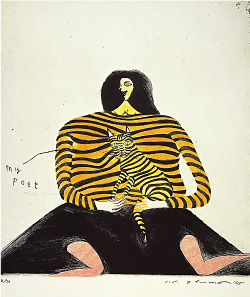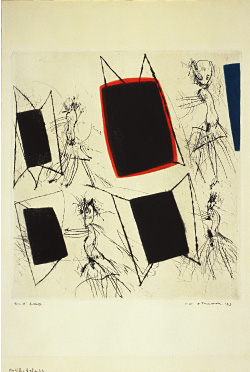1.Prints
Masuo Ikeda created over 1,000 print works. The selection presented here is carefully chosen to include examples of all his best known series, tracking the transitions in his style from earliest works to late in his life.
Ikeda began printmaking in 1956 at the recommendation of friend and fellow artist Ei-Q. The following year, Ikeda’s Sun and Woman was selected for the first International Biennial Exhibition of Prints in Tokyo. At the subsequent 2nd International Biennial Exhibition of Prints in Tokyo (1960), Portrait of Woman, Woman, Animals, and Woman won the prestigious Minister of Education, Science and Culture's Award, making him a celebrated artist at only twenty-six years old. In 1966, he exhibited twenty-eight copperplate prints, including Lady Making Up, Rose is Rose, Spring and Springs and A Certain Relation at the 33rd Venice Biennale, winning the Grand Prize in Printmaking, an achievement which meant that Masuo Ikeda had already reached the pinnacle of the international art world as a printmaker at the age of thirty-two.
Despite this success, Ikeda did not rest. He experimented with different techniques, including lithography, mezzotint, and even computer graphics, and his style went through substantial changes, shifting to pop art, erotica, and a stylistic return to Japan in a series of bold challenges that tested his ability as a printmaker. Ikeda’s prints from different periods change to such an extent that they give the impression of being executed by a different artist.
 |
|
 |
Rose is Rose
drypoint, roulette and burin on paper 1966 |
|
My Poet, My Cat
drypoint and roulette on paper 1965 |
 |
|
 |
Ladies Going to the Door in a Hurry
drypoint and roulette on paper 1963 |
|
Half of Marilin
lithograph on paper 1968 |
|
![]()